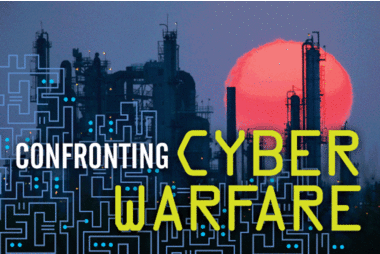The new cyber arms race
Tomorrow's wars will be fought not just with guns, but with the click of a mouse half a world away that will unleash weaponized software that could take out everything from the power grid to a chemical plant.
This is the cover story of the Mar. 7 weekly version of The Christian Science Monitor.
AP Photo/John Kehe staff illustration
Deep inside a glass-and-concrete office building in suburban Washington, Sean McGurk grasps the handle of a vault door, clicks in a secret entry code, and swings the steel slab open. Stepping over the raised lip of a submarinelike bulkhead, he enters a room bristling with some of the most sophisticated technology in the United States.
Banks of computers, hard drives humming on desktops, are tied into an electronic filtering system that monitors billions of bits of information flowing into dozens of federal agencies each second. At any given moment, an analyst can pop up information on a wall of five massive television screens that almost makes this feel like Cowboys Stadium in Arlington, Texas, rather than a bland office building in Arlington, Va.
The overriding purpose of all of it: to help prevent what could lead to the next world war.
Specifically, the "Einstein II" system, as it is called, is intended to detect a large cyberattack against the US. The first signs of such an "electronic Pearl Harbor" might include a power failure across a vast portion of the nation's electric grid. It might be the crash of a vital military computer network. It could be a sudden poison gas release at a chemical plant or an explosion at an oil refinery.
Whatever it is, the scores of analysts staffing this new multimillion-dollar "watch and warn" center would, presumably, be able to see it and respond, says Mr. McGurk, the facility director. The National Cybersecurity and Communications Integration Center (NCCIC, pronounced en-kick) is one of the crown jewels of the Department of Homeland Security (DHS). It is linked to four other key watch centers run by the FBI, the Department of Defense (DOD), and the National Security Agency (NSA) that monitor military and overseas computer networks.
They are monuments to what is rapidly becoming a new global arms race. In the future, wars will not just be fought by soldiers with guns or with planes that drop bombs. They will also be fought with the click of a mouse a half a world away that unleashes carefully weaponized computer programs that disrupt or destroy critical industries like utilities, transportation, communications, and energy. Such attacks could also disable military networks that control the movement of troops, the path of jet fighters, the command and control of warships.
"The next time we want to go to war, maybe we wouldn't even need to bomb a country," says Liam O'Murchu, manager of operations for Symantec Security Response, a Mountain View, Calif., computer security firm. "We could just, you know, turn off its power."
In this detached new warfare, soldiers wouldn't be killing other soldiers on the field of battle. But it doesn't mean there might not be casualties. Knocking out the power alone in a large section of the US could sow chaos. What if there were no heat in New England in January? No refrigeration for food? The leak of a radiation plume or chemical gas in an urban area? A sudden malfunction of the stock market? A disrupted air traffic control system?
These are the darkest scenarios, of course – the kind that people spin to sell books and pump up budgets for new cyberwar technology. Interviews with dozens of cyberconflict experts indicate that this kind of strategic, large-scale digital warfare – while possible – is not the most likely to happen. Instead, some see a prolonged period of aggressive cyberespionage, sabotage, and low-level attacks that damage electronic networks. As one recent study done for the Organization for Economic Cooperation and Development put it: "It is unlikely that there will ever be a true cyberwar."
This article continues: http://www.csmonitor.com/USA/Military/2011/0307/The-new-cyber-arms-race/%28page%29/2
